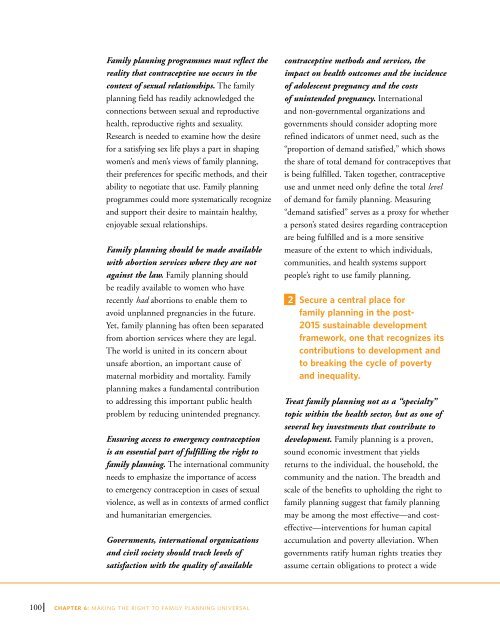State of World Population 2012 - Country Page List - UNFPA
State of World Population 2012 - Country Page List - UNFPA
State of World Population 2012 - Country Page List - UNFPA
You also want an ePaper? Increase the reach of your titles
YUMPU automatically turns print PDFs into web optimized ePapers that Google loves.
Family planning programmes must reflect the<br />
reality that contraceptive use occurs in the<br />
context <strong>of</strong> sexual relationships. The family<br />
planning field has readily acknowledged the<br />
connections between sexual and reproductive<br />
health, reproductive rights and sexuality.<br />
Research is needed to examine how the desire<br />
for a satisfying sex life plays a part in shaping<br />
women’s and men’s views <strong>of</strong> family planning,<br />
their preferences for specific methods, and their<br />
ability to negotiate that use. Family planning<br />
programmes could more systematically recognize<br />
and support their desire to maintain healthy,<br />
enjoyable sexual relationships.<br />
Family planning should be made available<br />
with abortion services where they are not<br />
against the law. Family planning should<br />
be readily available to women who have<br />
recently had abortions to enable them to<br />
avoid unplanned pregnancies in the future.<br />
Yet, family planning has <strong>of</strong>ten been separated<br />
from abortion services where they are legal.<br />
The world is united in its concern about<br />
unsafe abortion, an important cause <strong>of</strong><br />
maternal morbidity and mortality. Family<br />
planning makes a fundamental contribution<br />
to addressing this important public health<br />
problem by reducing unintended pregnancy.<br />
Ensuring access to emergency contraception<br />
is an essential part <strong>of</strong> fulfilling the right to<br />
family planning. The international community<br />
needs to emphasize the importance <strong>of</strong> access<br />
to emergency contraception in cases <strong>of</strong> sexual<br />
violence, as well as in contexts <strong>of</strong> armed conflict<br />
and humanitarian emergencies.<br />
Governments, international organizations<br />
and civil society should track levels <strong>of</strong><br />
satisfaction with the quality <strong>of</strong> available<br />
contraceptive methods and services, the<br />
impact on health outcomes and the incidence<br />
<strong>of</strong> adolescent pregnancy and the costs<br />
<strong>of</strong> unintended pregnancy. International<br />
and non-governmental organizations and<br />
governments should consider adopting more<br />
refined indicators <strong>of</strong> unmet need, such as the<br />
“proportion <strong>of</strong> demand satisfied,” which shows<br />
the share <strong>of</strong> total demand for contraceptives that<br />
is being fulfilled. Taken together, contraceptive<br />
use and unmet need only define the total level<br />
<strong>of</strong> demand for family planning. Measuring<br />
“demand satisfied” serves as a proxy for whether<br />
a person’s stated desires regarding contraception<br />
are being fulfilled and is a more sensitive<br />
measure <strong>of</strong> the extent to which individuals,<br />
communities, and health systems support<br />
people’s right to use family planning.<br />
2 Secure a central place for<br />
family planning in the post-<br />
2015 sustainable development<br />
framework, one that recognizes its<br />
contributions to development and<br />
to breaking the cycle <strong>of</strong> poverty<br />
and inequality.<br />
Treat family planning not as a “specialty”<br />
topic within the health sector, but as one <strong>of</strong><br />
several key investments that contribute to<br />
development. Family planning is a proven,<br />
sound economic investment that yields<br />
returns to the individual, the household, the<br />
community and the nation. The breadth and<br />
scale <strong>of</strong> the benefits to upholding the right to<br />
family planning suggest that family planning<br />
may be among the most effective—and costeffective—interventions<br />
for human capital<br />
accumulation and poverty alleviation. When<br />
governments ratify human rights treaties they<br />
assume certain obligations to protect a wide<br />
100 CHAPTER 6: MAKING THE RIGHT TO FAMILY PLANNING UNIVERSAL
















